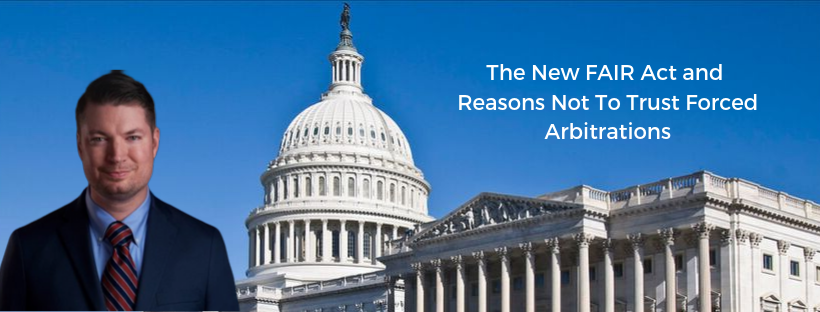As an attorney, I can tell you that private arbitration is one of the worst things you can agree to in a contract. As recently stated by one member of Congress, “Arbitration is one of the central ways in which corporate America has rigged the system against middle class families, working people.” Rep. Rosa DeLauro (D-CT). On September 20, 2019 the US House of Representatives passed the Forced Arbitration Injustice Repeal (FAIR) Act, a far-reaching bill that bans companies from requiring workers and consumers to resolve legal disputes in private arbitration. The Act is a beginning point to chip away at some of the most unfair aspects of arbitration. Here are some of the many, many reasons this bill should be supported:
- Most people don’t even know they’ve agreed to an arbitration. It’s buried in a long contract you had to sign to get a job, buy a car, etc.
- Arbitrations are used to hide embarrassing but publicly important causes of action. Like if an employer has a dozen sexual harassment claims against it, those claims may have been buried in a private arbitration so you can’t find out about them.
- The arbitrator may not be neutral or independent. Unbelievably, many arbitration agreements provide for a “partisan” arbitrator. In other words, you seek an arbitration and it turns out one of the arbitrators just retired from the company you are making a claim against after working there for 30 years. Not exactly a neutral arbitrator. Incredibly, courts have upheld these types of provisions.
- Arbitration is way more expensive than going to court. Arbitrations are sold as “faster and less expensive” than going to court. No way. The first thing you will get is a huge bill for a deposit for the arbitrator. If it’s no more than $3,000, count yourself lucky but at the end of the day you will pay substantially more. Also, statistics show that the average arbitration takes 524 days. Arbitration is neither faster, nor less expensive than going to court. You will also still need an attorney in arbitration as well.
- There is no bargaining power for the average person. The arbitration provision is non-negotiable. If you don’t sign off, you simply don’t get the job or don’t get the goods or services you want.
- Arbitrations are used to prevent class actions. In the auto sales industry in particular, it is popular to have a buyer sign anti-class action arbitrations. This means that if the company is ripping you off but only for a few hundred dollars, you won’t be able to find an attorney to take your case because you can’t aggregate your case with other similarly-situated people to form a class action case.
- The is no accountability for the arbitrator. If you don’t like a Judge, you vote him/her out of office. If you don’t like an arbitrator…forget it. You have no recourse.
Overall, forced arbitration is terrible for the common person. Here’s to hoping the FAIR act passes and becomes law.
 September 21, 2019
September 21, 2019